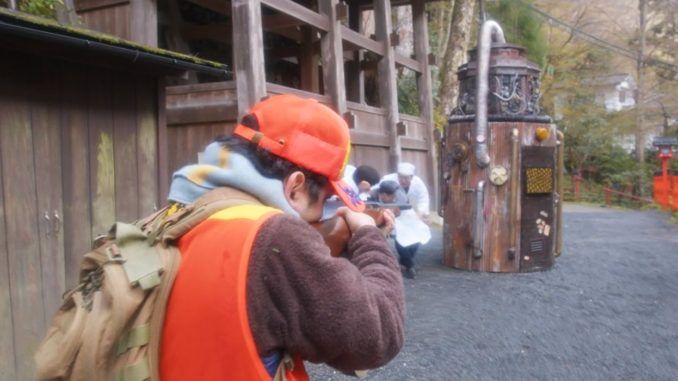
Rating: B
Dir: Junta Yamaguchi
Star: Riko Fujitani, Manami Honjô, Gôta Ishida, Yûki Torigoe
Following up on the wonders of Beyond the Infinite Two Minutes, Yamaguchi goes back to the fun-sized time travel well, once again. Although the results aren’t quite as effective, meandering off-track more than I wanted, it still does a lot with a little. The location here is a mountain inn, where the staff and residents find themselves stuck in a time loop. Every two minutes, they reset to where they were previously, although they retain the memories and experiences of the previous cycle. Hotel maid Mikoto (Fujitani) suspects she might be responsible, having been praying to the river god to stop time, due to a situation unfolding with her crush, Taku (Torigoe), and his impending departure.
This is probably the least interesting of the many threads present. That’s what I mean about the film meandering off track, since the later stages are more concerned about Mikoto’s romantic entanglement. It then causes the eventual resolution to appear suddenly, like a rabbit pulled out of a hat. I’d rather have heard more about that, and less of the lovey-dovey stuff. However, there’s still a lot to enjoy here, particularly in the early stages, with Mikoto and the other staff trying to come to terms with what’s happening. What’s fascinating – and particularly Japanese – is that they remain thoroughly committed to providing excellent customer service to their guests. I can’t quite imagine this happening under similar circumstances at your typical Motel 6.
 Indeed, there’s also something Japanese, about the way most people accept the scenario and adjust accordingly, rolling up their sleeves and getting on with it. This might mean trying to find the scope of the problem, locate the cause, or take care of those who are struggling with the situation. I suspect a Western version would add considerably more conflict. This has a generally more optimistic bent, even treating the topics of suicide and death with a relatively light touch. Depth is provided by the different ways in which the visitors and employees react to the situation. For example, there’s a writer with creative block, who is overjoyed to be stuck in the loop, since it’s a perfect way to avoid having to meet his looming deadline.
Indeed, there’s also something Japanese, about the way most people accept the scenario and adjust accordingly, rolling up their sleeves and getting on with it. This might mean trying to find the scope of the problem, locate the cause, or take care of those who are struggling with the situation. I suspect a Western version would add considerably more conflict. This has a generally more optimistic bent, even treating the topics of suicide and death with a relatively light touch. Depth is provided by the different ways in which the visitors and employees react to the situation. For example, there’s a writer with creative block, who is overjoyed to be stuck in the loop, since it’s a perfect way to avoid having to meet his looming deadline.
Compared to Two Minutes, it’s more technically restrained. While each cycle takes place in a single shot, it is a much more manageable two minutes, rather than having to sustain the illusion for seventy. Nor is there any need to show people having conversations with themselves. I did notice inconsistency with the weather: some cycles start with snow, others don’t. It’s easy to forgive such things, because Yamaguchi has again created, along with writer Makoto Ueda, an engaging work, which manages to be intelligent and heartwarming. The resolution (top) may remind you of a certain, long-running British television series. Other aspects could do too, feeling like one of the “side quest” episodes from said show, back when it was good. There are an awful lot worse things to resemble.
